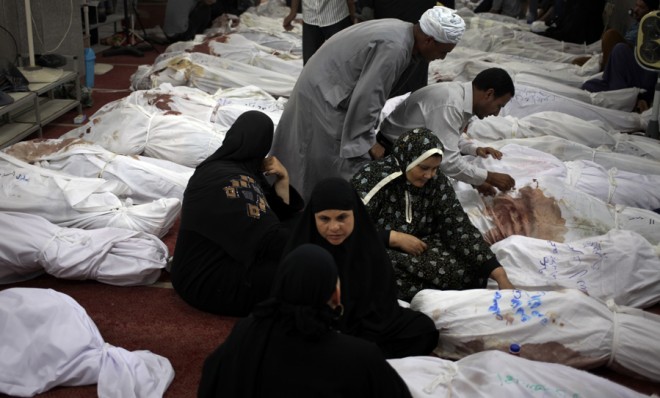Is there still hope for the Arab Spring?
As chaos reigns in Egypt, many say the region's democratic revolution has flamed out

A free daily email with the biggest news stories of the day – and the best features from TheWeek.com
You are now subscribed
Your newsletter sign-up was successful
In 2011, inspired by an uprising in Tunisia, thousands of Egyptians took to the streets for 18 days to demand that President Hosni Mubarak step down. To the surprise of many, he did.
"We can breathe fresh air, we can feel our freedom," Gamal Heshamt, a former member of the country's parliament, told The New York Times shortly after it happened. "After 30 years of absence from the world, Egypt is back."
The optimism in Cairo's Tahrir Square was palpable:
The Week
Escape your echo chamber. Get the facts behind the news, plus analysis from multiple perspectives.

Sign up for The Week's Free Newsletters
From our morning news briefing to a weekly Good News Newsletter, get the best of The Week delivered directly to your inbox.
From our morning news briefing to a weekly Good News Newsletter, get the best of The Week delivered directly to your inbox.
But in the last few days the dream of a democratic Egypt has swiftly turned to nightmare. More than 500 people have reportedly died in clashes between the security forces of the military-led government and supporters of former President Mohammed Morsi, the man who was democratically elected to replace Mubarak.
Other countries that were swept up in the Arab Spring are struggling as well. Last month in Tunisia, where it all started, outrage grew over the assassination of liberal opposition leader Mohamed Brahmi, leading to criticism that the ruling Islamist party was too cozy with extremist groups.
Two years ago this month, the people of Libya — partly inspired by what happened in Egypt — ousted dictator Moammar Gadhafi. Afterwards, as the The New Yorker's Jon Lee Anderson reported, the country became "fatally destabilized" when "militias that arose on various regional battlefronts found themselves in possession of vast arsenals and large swaths of territory."
The uprising in Syria, of course, has devolved into an intractable civil war, with the death toll currently at 100,000 and counting.
A free daily email with the biggest news stories of the day – and the best features from TheWeek.com
Has the Arab Spring come to a bloody end?
Granted, no one expected an entire region to make the transition to liberal democracy quickly and cleanly.
"Our revolution isn’t dead, it is bringing Egypt back to life, painfully and messily," argued Egyptian writer Mona Eltahawy in The New York Times. "Egypt is like a house that’s been under lock and key, every door and window trapped shut for more than 60 years. The revolution kicked them all open and the stench is unbearable. But we are persevering."
Nabila Ramdani, writing in The Guardian, agreed that revolutions are messy business, but still found the prevalence of violence troubling:
Nobody pretended that the Arab Spring would provide a quick fix to the massive problems inherent in Arab societies, but if military force continues to remain the ultimate arbiter of which government is 'allowed' to rule, then the killings will carry on unabated. [The Guardian]
Despite the bloodshed, some scholars are taking the longview. Zaid al-Ali, a Cairo-based constitutional expert, noted that, despite setbacks, citizens in Arab Spring countries seemed more willing to publicly criticize their leaders.
“This dynamic of free expression, of political liberalization where now you have lots of political parties and people expressing themselves freely, this will lead us in a positive direction in the long run,” he told the Times.
Even before the region became embroiled in violence, experts were comparing the Arab Spring to the revolutions of 1848, when people rose up across more than 50 countries in Europe to demand, and in some case win, political freedoms.
Most of those nascent movements were eventually suppressed by entrenched military and aristocratic forces. They did, however, serve as the catalyst for democracy in Europe.
When the Arab Spring first became news, Slate's Anne Applebaum predicted that in the next few years that "some or even all of these revolutions might be seen to have failed." That, she claimed, would be shortsighted assumption:
Television creates the illusion of a linear narrative and gives events the semblance of a beginning, a middle, and an end. Real life is never like that; 1848 wasn't like that. It's useful to ponder the messiness of history from time to time, because it reminds us that the present is really no different. [Slate]
Keith Wagstaff is a staff writer at TheWeek.com covering politics and current events. He has previously written for such publications as TIME, Details, VICE, and the Village Voice.
-
 Local elections 2026: where are they and who is expected to win?
Local elections 2026: where are they and who is expected to win?The Explainer Labour is braced for heavy losses and U-turn on postponing some council elections hasn’t helped the party’s prospects
-
 6 of the world’s most accessible destinations
6 of the world’s most accessible destinationsThe Week Recommends Experience all of Berlin, Singapore and Sydney
-
 How the FCC’s ‘equal time’ rule works
How the FCC’s ‘equal time’ rule worksIn the Spotlight The law is at the heart of the Colbert-CBS conflict